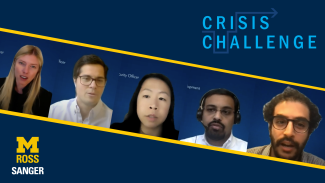First-Ever Virtual Leadership Crisis Challenge at Michigan Ross Immerses Students and Alumni in Hacking and Personal Security Scandal

A realistic company crisis; student teams thrust into C-suite roles; alumni serving as demanding board members and tough judges; and an intense press conference — the first-ever virtual Leadership Crisis Challenge delivered all the hallmarks of the much-loved program, along with its own twists and turns.
More than 220 graduate students and 28 alumni from the Ross School of Business and across the University of Michigan participated in this year’s virtual edition of the challenge, held Jan. 28-29. The program, developed by the Sanger Leadership Center at Michigan Ross, asks students to assume executive leadership roles at fictitious companies. They are given just 24 hours to navigate a simulated company crisis that spins increasingly out of control as the hours quickly tick by.
This year’s challenge featured FullSafe, a smart home security company that became embroiled in a hacking and privacy scandal. Student teams learned a security researcher had publicly revealed that they found a point of entry into FullSafe’s system, allowing malicious hackers to lock doors, hack cameras, and cause other dangerous malfunctions.
After reflecting on learning goals for the program, students began strategizing how to handle the crisis while receiving a flood of messages from FullSafe stakeholders. While dealing with the virtual onslaught, the students worked all night developing a response plan to present to the FullSafe’s board of directors (role-played by distinguished Michigan alumni and friends) the next morning.
The top three performing teams from the board presentations moved on to the finalist round, where they faced real journalists in a heated press conference. After tackling tough questions from the journalists as well as listening to feedback from the virtual audience, the winning team was chosen.
Michigan Ross Part-Time MBAs take first place
For the first time, a team of Michigan Ross Part-Time students was declared the winner of the challenge, earning a $3,000 scholarship. The two runner-up teams were awarded a $1,000 prize.
Members of the winning team were Elizabeth Fu, WMBA ’22; Natalie Juronoc, WMBA ’21; Gamal Elbialy, WMBA ’22; Juan Souchon, Evening MBA ’21; and Dennis Emmatty, Evening MBA ’21.
“From the moment our Zoom call started on Thursday evening, we were all really level-headed,” explained Juronoc, a senior strategic growth manager at Huge. “We each brought different strengths and professional backgrounds to the table, and looking back, I think the fact that we all had trust for one another (despite being complete strangers!) was paramount to our success.”
Every member of the winning team said the program exceeded expectations.
The Sanger Leadership Center did an excellent job crafting a realistic scenario with all the supplementary events to bring it to life, from the live social media feed with ‘real’ customers, to the board meeting, to the media event, each element felt thoroughly seamless to create an unforgettable learning experience.
Fu said the realism of the simulated company crisis was one of her main motivations for participating in the challenge and provided her key learning outcomes.
“Every industry and company will face a time of unexpected challenge,” Fu noted. “Hopefully, I can take these lessons learned and apply them as a C-suite executive in the future.”
Alumni praise the realism of the Leadership Crisis Challenge and student performance
This was the third time Angela Bodley-Carter, MBA ’07, compliance director at Owens Corning, volunteered as one of the Michigan Ross alumni to play a board member.
“While these are fictional crises, I still manage to learn a lot from how the students approach the crisis and from the questions and expectations of my fellow board members,” she said. “The crisis challenge is a nice way for me to break from my day-to-day and imagine how I might respond to a crisis.”
Repeat volunteer Sandy Beach Lin, MBA ’82, board member of American Electric Power, thought the virtual format of this year’s challenge even more realistic. “This is how companies and boards are dealing with challenges during the pandemic,” she said.
First-time participant Sujit Kumar, MBA ’01, co-Founder and CEO of Seattle-based PatCen Healthcare, appreciated the realism of the challenge.
“Having been in such a crisis myself in 2016, I was able to relate well to the situation,” said Sujit. “I felt the students were articulate, presented the core issues well, and each team laid out their solutions well.”
Sujit was not alone. Besides praising the simulated crisis, Michigan Ross alumni all agreed the graduate students did a great job handling the intensity of the challenge.
The quality of preparation and level of performance was off the charts. So proud to be a Ross alum!










